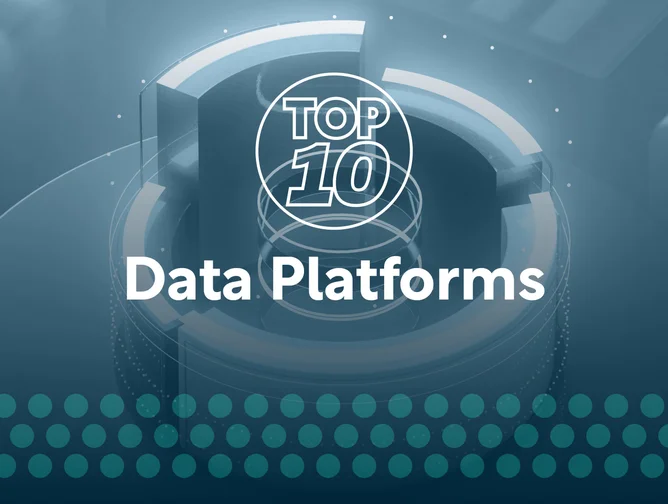
AI Magazine looks at the top data platforms as businesses compete to provide better applications and insights from the data that create their models.
Platforms that manage the data are becoming increasingly crucial as AI adoption picks up speed. For example, OpenAI’s well-known GPT-3 is thought to have been trained on over 45 terabytes of text data alone.
Given the scale of the task required for large language models and other AI models, platforms for data science and machine learning are vital resources for businesses trying to use data to spur creativity and decision-making.
By analyzing data from many sources and taking into account aspects like essential features, usability, and user feedback, AI Magazine evaluates ten of the top data platforms that are advancing AI capabilities or introducing novel applications.
An open-source platform for data analytics, reporting, and integration is called KNIME (Konstanz Information Miner). It offers tools for putting models into production, a graphical user interface for creating data pipelines, and integration with well-known machine-learning libraries.
A commercial software package called KNIME Hub, which facilitates team-based collaboration and workflow automation, deployment, and management, is combined with an open-source analytics platform to form KNIME.
9: Altair RapidMiner
One data science software that offers a visual workflow builder for creating machine learning models is called RapidMiner.
It provides a large selection of pre-built templates, tools for validating and deploying models, and support for several data sources. Expert and citizen data scientists may collaborate and manage end-to-end data science pipelines with ease thanks to RapidMiner.
8: Dataiku
A platform for data science and machine learning called Dataiku makes it possible for groups to work together on data projects. For the purposes of data preparation, exploration, modeling, and deployment, it offers an intuitive user interface. Dataiku interfaces with widely-used programs such as R, Python, and Spark, and supports a multitude of data sources.
Both non-technical and technical users can utilize the platform because it streamlines the entire machine-learning lifecycle and automates repetitive processes.
7: H2O.ai
An open-source platform for creating machine learning models is offered by H2O.ai. It provides a number of tools, such as H2O Wave for creating AI applications, Driverless AI for automated machine learning, and H2O-3 for scaled machine learning.
H2O.ai is renowned for supporting a broad variety of methods and data sources and for having strong machine-learning capabilities.
6: DataRobot
A platform for automated machine learning called DataRobot makes the process of creating and implementing predictive models faster. Because of its intuitive interface, automatic feature engineering, and model selection capabilities, it is suitable for both business analysts and data scientists.
A variety of regression, classification, and time series methods are supported by DataRobot, which also offers bias detection and model interpretability.
5: Databricks Unified Analytics Platform
The Databricks Unified Analytics Platform is a platform that integrates data science and data engineering functionalities. Built on top of Apache Spark, it offers data teams a collaborative workspace where they can create and implement machine learning models at scale.
Large-scale data processing capabilities and interaction with well-known data sources and machine learning frameworks are two of Databricks’ best-known features.
4: IBM Watson Studio
When working on machine learning projects, data scientists, application developers, and subject matter experts can collaborate in IBM Watson Studio.
It provides tools for creating, preparing, and deploying models in addition to integrating with IBM’s AI services. Watson Studio is renowned for supporting a broad range of data science and machine learning tasks and for having strong analytics capabilities.
3: Amazon SageMaker
With Amazon SageMaker, a fully managed service, data scientists and developers can easily create, train, and implement machine learning models. It provides extensive deployment capabilities, support for common frameworks, and a variety of built-in algorithms.
SageMaker is a well-liked option for businesses due to its scalability, user-friendliness, and compatibility with other AWS services.
2: Google Cloud Vertex AI
A wide range of tools are available for creating, implementing, and overseeing machine learning models with Google Cloud AI Platform.
With its smooth integration with TensorFlow and sophisticated capabilities like AutoML, users can quickly and easily create models of excellent quality. Google Cloud AI Platform is a top option for businesses wishing to use AI and machine learning because of its reliable infrastructure, scalability, and support for a variety of machine learning workloads.
Furthermore, pre-trained models and APIs for a range of AI applications, including speech recognition, computer vision, and natural language processing, are offered via the Google Cloud AI Platform.
Additionally, it provides managed services like AI Platform Pipelines, which automate and orchestrate machine learning pipelines, and Notebooks, which facilitate collaborative data science workflows. Google’s AI Platform is an appealing option due to its depth of knowledge in AI and dedication to open-source projects like TensorFlow.
1: Microsoft Azure Machine Learning
Building, training, and deploying machine learning models is made easier with the help of Microsoft Azure Machine Learning, a cloud-based service.
It has several features, such as a drag-and-drop interface, automatic machine learning, and integration with well-known frameworks like PyTorch and TensorFlow. Azure Machine Learning is a top platform for data science and machine learning applications because of its extensive feature set, scalability, and connection with other Microsoft services.
Because of its robust corporate features and ability to handle end-to-end machine learning workflows, it is the preferred option for businesses across the globe. In addition, Azure Machine Learning offers MLOps tools to expedite the deployment and monitoring of machine learning models, and responsible AI to aid in evaluating model fairness and minimizing biases. Azure Machine Learning is made stronger by Microsoft’s deep knowledge of enterprise software and its dedication to open-source projects like PyTorch.

